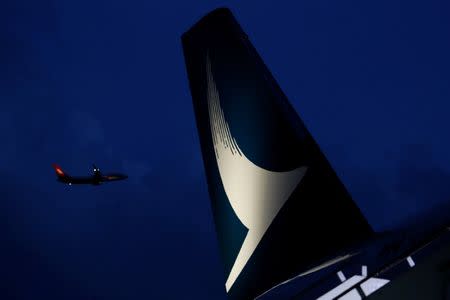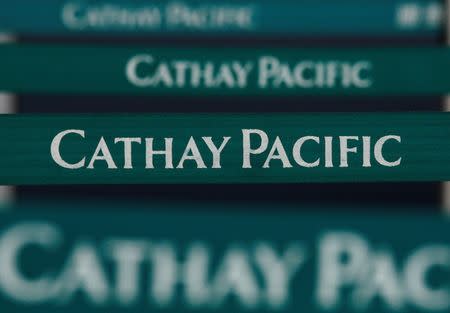Cathay Pacific on turnaround path after annual loss below expectations
By Brenda Goh and Jamie Freed
SHANGHAI/SINGAPORE (Reuters) - Cathay Pacific posted a smaller than expected annual loss due to a rebound in the cargo market, moderating ticket price falls and lower fuel hedging losses, prompting analysts to call that the worst was over for the Hong Kong airline.
Poor hedging bets on fuel prices and fierce competition from mainland Chinese and Middle Eastern rivals have hurt Cathay, pushing it into losses for the past two years and forcing the airline to undertake a three-year turnaround programme targeting HK$4 billion ($510.12 million) in savings.
While analysts said it was still too early to say whether the efforts under Chief Executive Rupert Hogg were bearing fruit, they said the firm was benefiting from a global recovery in the cargo market and profits at its associates and subsidiaries.
Cathay reported on Wednesday a net loss of HK$1.26 billion for 2017, its biggest in nine years. The loss was wider than the prior year's HK$575 million but much smaller than an average loss estimate of HK$2.15 billion drawn from 11 analysts polled by Thomson Reuters.
Full-year revenue grew 4.9 percent to HK$97.28 billion. The airline reported a profit of HK$792 million in the second half which offset its first half loss of HK$2.05 billion.
Cathay shares rose as much as 3.2 percent after the results on Wednesday to its highest in almost two-and-a-half years, before ending unchanged.
"We believe the worst is over for Cathay Pacific and we forecast Cathay to turn around with a small net profit of HK$377 million this year," said Corrine Png, chief executive of transport research firm Crucial Perspective.
"2019 will be a much better year for Cathay Pacific as its expensive fuel hedges finally roll over."
YIELD DECLINES MODERATING
Cathay's loss for 2017 was its first consecutive annual loss and the fourth yearly loss since it was founded in 1946. Under the revamp plan launched last year, it has announced job cuts and plans to boost productivity including increasing the number of economy-class seats on Boeing 777 planes.
Paul Loo, Cathay's chief customer and commercial officer, said at a press conference that the airline did not currently have plans for more layoffs, and declined to comment on whether the firm had set a cost target for 2018. The firm announced its biggest job cuts in 20 years last May.
He said Cathay expects continued growth in its cargo and mail business, which saw yields rise 11.3 percent in 2017 thanks to drivers like e-commerce. He added that the airline did not expect proposed tariffs by U.S. President Donald Trump on Chinese goods to impact the cargo business.
Cathay reported a 3.3 percent decline in yields, a proxy for ticket prices, in 2017, although it said they had improved by 3.1 percent in the second half of the year compared with the first half.
Rivals such as Singapore Airlines and Qantas Airways have also reported a moderating pace of yield declines in recent months amid higher fuel prices that have added to airline cost bases. Cathay's mainland Chinese competitors have yet to report 2017 financial results.
Cathay's Chairman John Slosar warned in a statement that the Hong Kong carrier's operating costs were increasing due to rising fuel costs, even though its losses from expensive fuel hedging contracts shrank 24.6 percent over the year.
Hong Kong-listed Swire Pacific is Cathay's biggest shareholder with a 45 percent stake, followed by Air China which owns 30 percent through a cross-shareholding. Qatar Airways owns a 9.94 percent stake in Cathay.
($1 = 7.8413 Hong Kong dollars)
(Reporting by Brenda Goh in SHANGHAI and Jamie Freed in SINGAPORE; Additional Reporting by Tina Ge in HONG KONG; Editing by Edwina Gibbs and Muralikumar Anantharaman)

 Yahoo Finance
Yahoo Finance 

